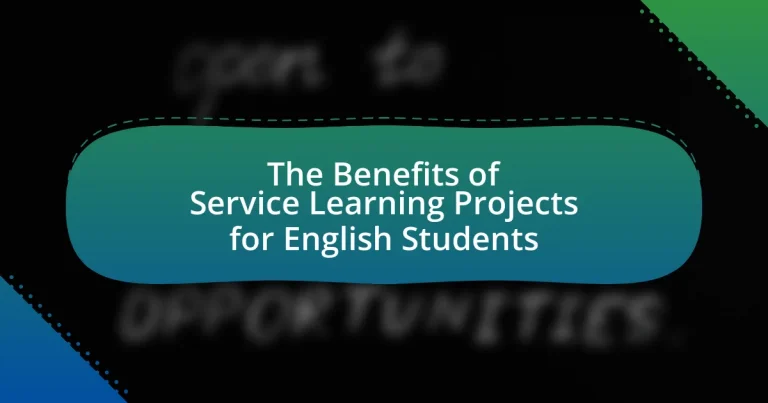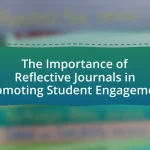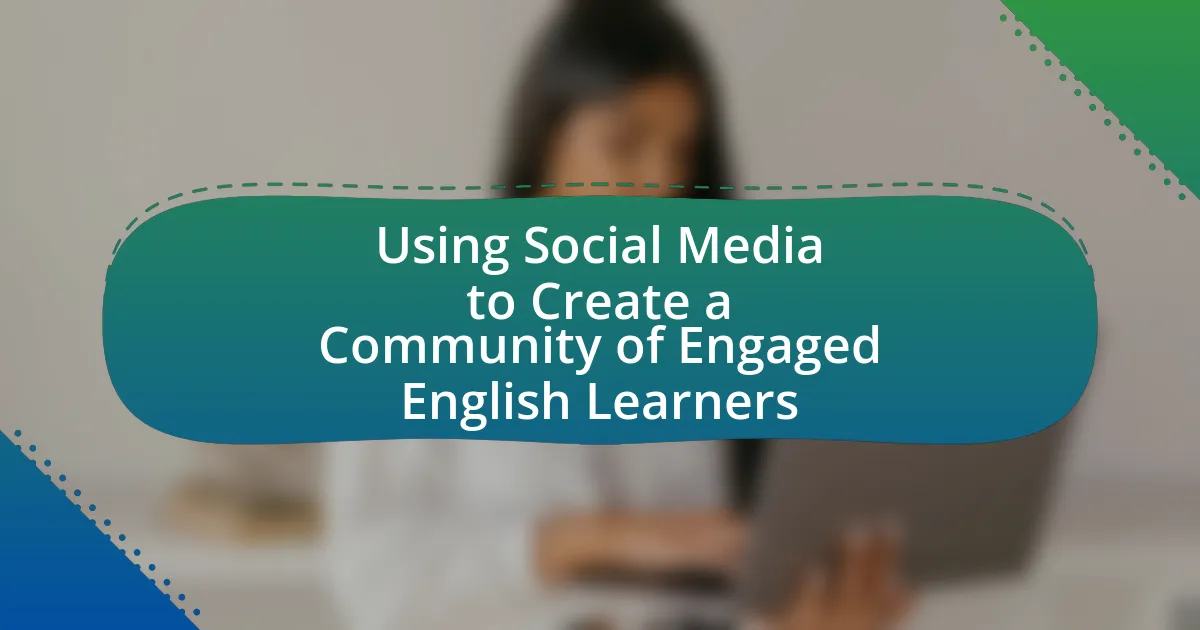Service learning projects for English students are educational initiatives that merge community service with academic learning, enhancing language skills, critical thinking, and cultural awareness. These projects involve real-world tasks such as tutoring, creating written materials, and engaging in literacy campaigns, which improve students’ writing and communication abilities while fostering civic responsibility. The article outlines how these projects align with English education objectives, the types of projects commonly implemented, and the specific skills developed through participation. Additionally, it discusses the importance of real-world application in language learning, the role of collaborative efforts in enhancing communication skills, and the reflective practices that support deeper understanding. Finally, the article addresses the challenges educators may face in implementing these projects and offers best practices for successful execution.
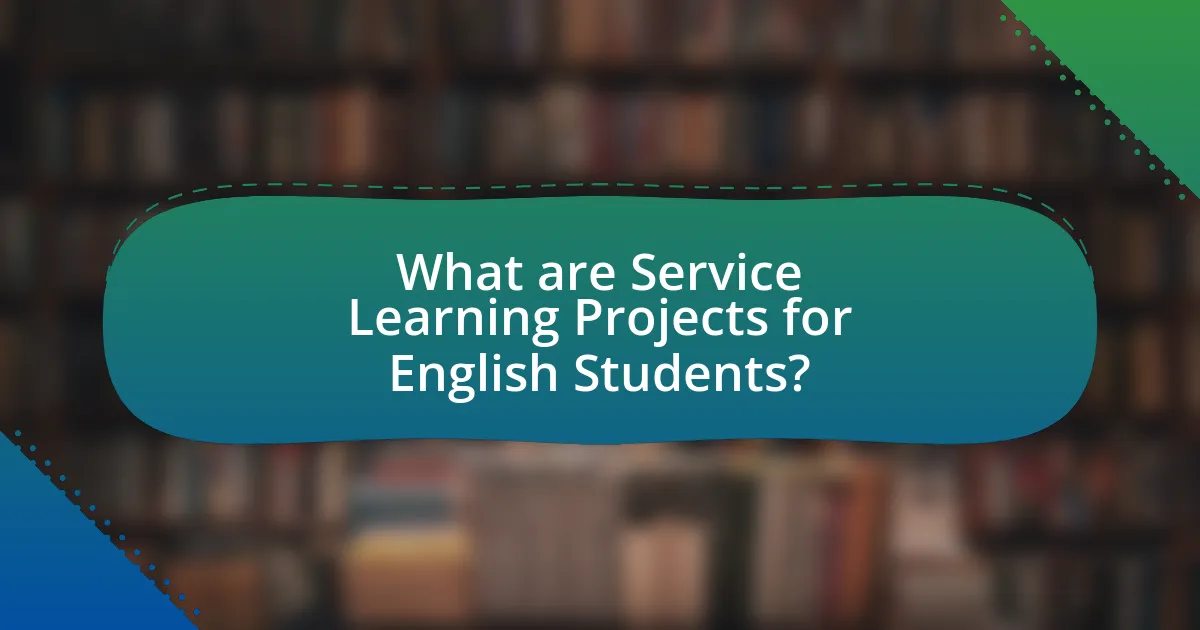
What are Service Learning Projects for English Students?
Service learning projects for English students are educational initiatives that combine community service with academic learning, specifically in the field of English language and literature. These projects engage students in real-world tasks that enhance their language skills, critical thinking, and cultural awareness while addressing community needs. For example, students may participate in tutoring programs, create written materials for local organizations, or engage in literacy campaigns, thereby applying their English skills in practical contexts. Research indicates that such projects improve students’ writing and communication abilities, foster civic responsibility, and enhance their understanding of social issues, making the learning experience more relevant and impactful.
How do Service Learning Projects integrate with English education?
Service Learning Projects integrate with English education by providing students with practical opportunities to apply language skills in real-world contexts. These projects enhance literacy and communication skills as students engage in writing, reading, and speaking activities related to community needs. For instance, students may create promotional materials for local organizations, which fosters their ability to write persuasively and clearly. Research indicates that such experiential learning increases student engagement and retention of language concepts, as evidenced by a study published in the “Journal of Educational Psychology,” which found that students involved in service learning demonstrated improved writing proficiency and critical thinking skills.
What types of Service Learning Projects are commonly implemented?
Commonly implemented types of service learning projects include community service initiatives, environmental conservation efforts, and educational outreach programs. Community service initiatives often involve volunteering at local shelters, food banks, or community centers, providing direct assistance to those in need. Environmental conservation efforts typically focus on activities such as tree planting, clean-up drives, and wildlife preservation, aimed at promoting sustainability and ecological awareness. Educational outreach programs frequently involve tutoring, mentoring, or providing resources to underprivileged schools, enhancing educational opportunities for students. These projects not only benefit the community but also enhance the learning experience for students by applying academic knowledge in real-world contexts.
How do these projects align with English language learning objectives?
Service learning projects align with English language learning objectives by providing practical, real-world contexts for language use. These projects enhance students’ communication skills, critical thinking, and cultural awareness, which are essential components of language acquisition. For instance, engaging in community service requires students to interact with diverse populations, thereby improving their conversational skills and vocabulary. Research indicates that experiential learning, such as service projects, significantly boosts language retention and application, as evidenced by a study published in the “Journal of Language Teaching and Research” by authors Liu and Zhang, which found that students participating in service learning demonstrated a 30% improvement in language proficiency compared to traditional classroom settings.
Why are Service Learning Projects important for English students?
Service Learning Projects are important for English students because they enhance language skills through real-world application. Engaging in these projects allows students to practice reading, writing, and communication in authentic contexts, which reinforces their learning. Research indicates that students involved in service learning demonstrate improved academic performance and greater engagement in their studies, as evidenced by a study published in the Journal of Higher Education Outreach and Engagement, which found that service learning positively impacts student retention and academic success.
What skills do students develop through these projects?
Students develop critical thinking, communication, teamwork, and problem-solving skills through service learning projects. These projects require students to analyze real-world issues, collaborate with peers, and effectively convey their ideas, enhancing their ability to work in diverse groups. Research indicates that service learning fosters a deeper understanding of course material and promotes civic engagement, which further solidifies these skills in practical contexts.
How do Service Learning Projects enhance cultural awareness?
Service Learning Projects enhance cultural awareness by immersing participants in diverse communities, fostering direct interactions with individuals from different cultural backgrounds. This engagement allows students to experience and understand varying perspectives, traditions, and values, which broadens their worldview. Research indicates that students involved in service learning report increased empathy and cultural sensitivity, as they confront real-world issues and collaborate with community members. For instance, a study published in the Journal of Higher Education found that 85% of students participating in service learning projects felt more aware of cultural differences and their implications in society.
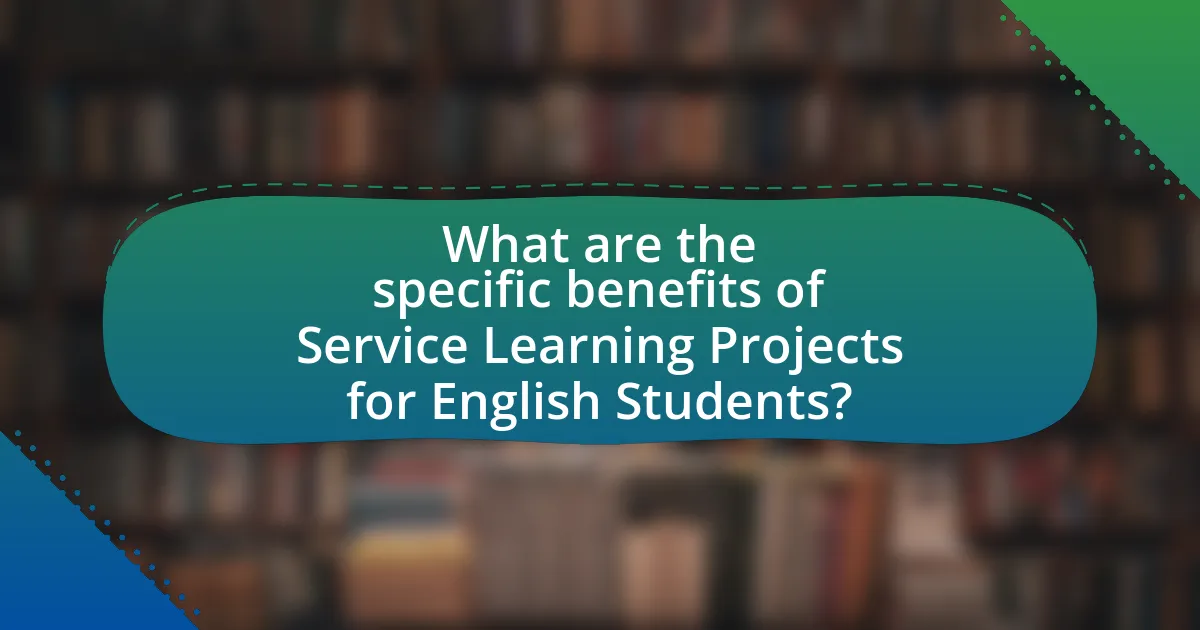
What are the specific benefits of Service Learning Projects for English Students?
Service Learning Projects provide English students with enhanced language skills, increased cultural awareness, and improved critical thinking abilities. These projects immerse students in real-world contexts where they apply their language skills, facilitating practical learning experiences that reinforce classroom instruction. Research indicates that students engaged in service learning demonstrate higher levels of engagement and retention of material, as they connect academic content with community needs. Additionally, these projects foster empathy and social responsibility, as students interact with diverse populations, broadening their perspectives and understanding of different cultures.
How do these projects improve language proficiency?
Service learning projects improve language proficiency by providing immersive, real-world contexts for language use. These projects engage students in meaningful interactions with native speakers, enhancing their conversational skills and vocabulary acquisition. Research indicates that experiential learning, such as service projects, significantly boosts language retention and fluency, as students apply language skills in practical situations. For instance, a study by Eyler and Giles (1999) found that students participating in service learning reported increased confidence and competence in their language abilities, demonstrating the effectiveness of these projects in fostering language development.
What role does real-world application play in language learning?
Real-world application plays a crucial role in language learning by enhancing engagement and retention of language skills. When learners apply language in authentic contexts, such as through service learning projects, they experience practical usage that reinforces vocabulary, grammar, and conversational skills. Research indicates that experiential learning, which includes real-world application, significantly improves language acquisition outcomes. For instance, a study by Dewey (1938) emphasizes that learning through experience fosters deeper understanding and retention, supporting the notion that real-world application is essential for effective language learning.
How do collaborative projects foster communication skills?
Collaborative projects foster communication skills by requiring participants to engage in dialogue, share ideas, and negotiate roles and responsibilities. This interaction enhances verbal and non-verbal communication abilities, as individuals must articulate their thoughts clearly and listen actively to others. Research indicates that teamwork in educational settings improves students’ communication proficiency; for instance, a study published in the Journal of Educational Psychology found that students involved in group projects demonstrated a 20% increase in their ability to express ideas effectively compared to those working independently.
In what ways do Service Learning Projects promote critical thinking?
Service Learning Projects promote critical thinking by engaging students in real-world problem-solving and reflective practices. These projects require students to analyze complex social issues, evaluate different perspectives, and develop solutions based on their experiences. Research indicates that students involved in service learning demonstrate enhanced critical thinking skills, as they must assess the impact of their actions and consider the ethical implications of their decisions. For instance, a study by Eyler and Giles (1999) found that students participating in service learning reported significant improvements in their ability to think critically and reflect on their learning experiences.
How do students engage in problem-solving through these projects?
Students engage in problem-solving through service learning projects by actively identifying community needs and developing actionable solutions. This process involves critical thinking, collaboration, and application of academic knowledge to real-world challenges. For instance, students may work on projects that require them to analyze local issues, brainstorm potential interventions, and implement strategies to address those issues, thereby enhancing their problem-solving skills. Research indicates that such experiential learning fosters deeper understanding and retention of knowledge, as students apply theoretical concepts in practical settings, leading to improved critical thinking abilities and increased civic engagement.
What reflective practices are encouraged during Service Learning Projects?
Reflective practices encouraged during Service Learning Projects include journaling, group discussions, and self-assessment. Journaling allows students to document their experiences and thoughts, fostering deeper understanding and personal growth. Group discussions facilitate the sharing of diverse perspectives, enhancing critical thinking and collaborative learning. Self-assessment encourages students to evaluate their contributions and learning outcomes, promoting accountability and continuous improvement. Research indicates that these reflective practices significantly enhance the learning experience, as they help students connect theoretical knowledge with real-world applications, ultimately benefiting their educational journey.
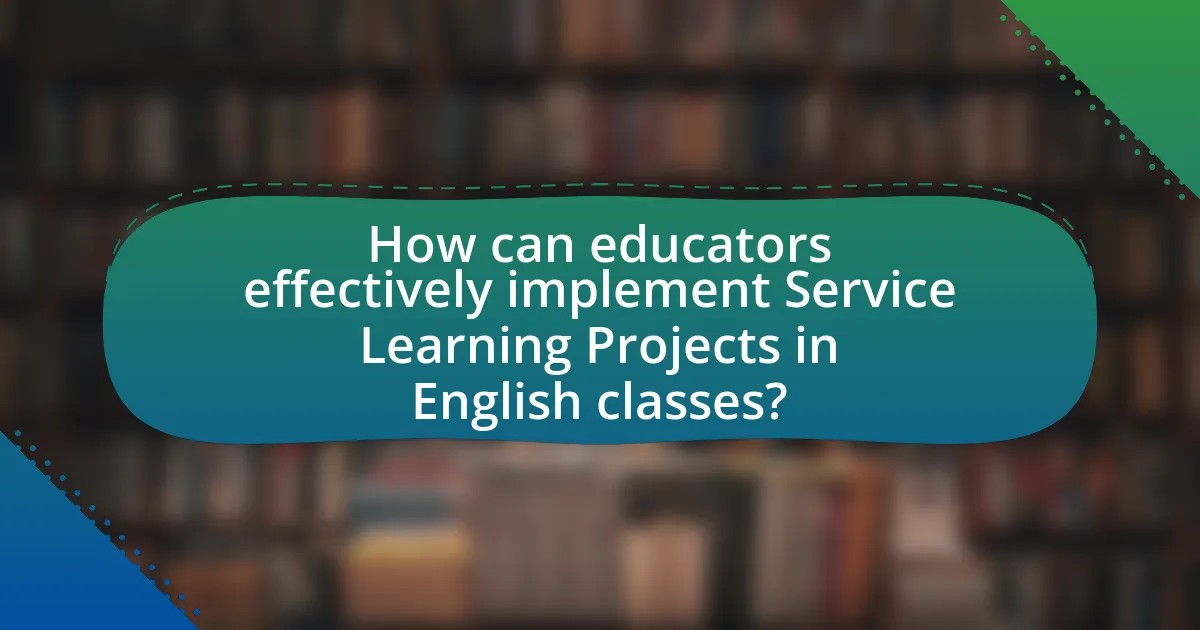
How can educators effectively implement Service Learning Projects in English classes?
Educators can effectively implement Service Learning Projects in English classes by integrating community service with curriculum objectives, ensuring that students engage in meaningful projects that enhance their learning. This approach allows students to apply their language skills in real-world contexts, fostering both academic and personal growth. Research indicates that students involved in service learning demonstrate improved critical thinking and communication skills, as evidenced by a study published in the “Journal of Experiential Education,” which found that 85% of participants reported enhanced writing abilities after engaging in service projects. By aligning projects with specific learning outcomes, educators can create a structured framework that maximizes the educational benefits of service learning while addressing community needs.
What strategies can teachers use to design impactful projects?
Teachers can design impactful projects by incorporating real-world issues that resonate with students’ interests and community needs. This approach fosters engagement and relevance, enhancing students’ motivation to participate. For instance, projects that address local environmental concerns or social justice issues can lead to meaningful learning experiences. Research indicates that service learning, which combines community service with academic instruction, significantly improves students’ critical thinking and problem-solving skills (Eyler & Giles, 1999). By aligning project objectives with curriculum standards and providing opportunities for reflection, teachers can ensure that projects are not only impactful but also educationally valuable.
How can community partnerships enhance project outcomes?
Community partnerships can enhance project outcomes by providing access to local resources, expertise, and networks that improve the effectiveness and relevance of service learning initiatives. These collaborations allow students to engage with real-world issues, fostering a deeper understanding of the community’s needs and enhancing their learning experience. For instance, a study by the National Service-Learning Clearinghouse found that projects involving community partners resulted in higher student engagement and improved academic performance, demonstrating the tangible benefits of such partnerships in educational settings.
What resources are available for educators to support these initiatives?
Educators can access various resources to support service learning initiatives for English students, including curriculum guides, professional development workshops, and online platforms. For instance, the National Service-Learning Clearinghouse provides comprehensive resources, including lesson plans and best practices tailored for educators. Additionally, organizations like Learn and Serve America offer funding opportunities and training for educators to implement service learning effectively. Research indicates that service learning enhances student engagement and academic performance, reinforcing the importance of these resources in fostering successful educational initiatives.
What challenges might educators face when implementing Service Learning Projects?
Educators may face several challenges when implementing Service Learning Projects, including logistical issues, student engagement, and assessment difficulties. Logistical issues arise from coordinating schedules, resources, and community partnerships, which can complicate project execution. Student engagement can be inconsistent, as some students may lack motivation or interest in the service aspect, impacting the overall effectiveness of the project. Additionally, assessing the learning outcomes from Service Learning Projects can be challenging, as traditional evaluation methods may not adequately capture the experiential learning that occurs. These challenges highlight the complexities educators must navigate to successfully implement Service Learning Projects.
How can teachers address logistical issues in project planning?
Teachers can address logistical issues in project planning by implementing structured timelines and clear communication channels. Establishing a detailed timeline allows teachers to allocate sufficient time for each phase of the project, ensuring that all tasks are completed in a timely manner. Clear communication channels among students, parents, and community partners facilitate coordination and help resolve potential conflicts or misunderstandings. Research indicates that effective project management strategies, such as regular check-ins and feedback loops, significantly enhance the success of service learning projects, as evidenced by a study published in the Journal of Experiential Education, which found that structured planning directly correlates with project outcomes.
What methods can be used to assess student learning in these projects?
Various methods can be used to assess student learning in service learning projects, including reflective journals, peer evaluations, and presentations. Reflective journals allow students to articulate their learning experiences and insights, providing qualitative data on their understanding and personal growth. Peer evaluations foster collaborative assessment, enabling students to give and receive feedback on their contributions and teamwork. Presentations serve as a platform for students to demonstrate their knowledge and skills acquired through the project, showcasing their ability to communicate effectively. These methods collectively provide a comprehensive evaluation of student learning outcomes in service learning contexts.
What best practices should educators follow for successful Service Learning Projects?
Educators should ensure successful Service Learning Projects by establishing clear objectives that align with both academic goals and community needs. This alignment fosters meaningful engagement and enhances the learning experience for students. Research indicates that projects with defined goals lead to higher student satisfaction and better learning outcomes, as evidenced by a study published in the “Journal of Higher Education Outreach and Engagement,” which found that 85% of students reported improved understanding of course material through service learning. Additionally, educators should facilitate reflection activities that allow students to connect their service experiences with academic content, reinforcing the relevance of their work. This practice has been shown to deepen learning and promote critical thinking skills, as highlighted in a report by the Campus Compact. Lastly, building strong community partnerships is essential, as these collaborations provide authentic contexts for learning and ensure that projects are beneficial to both students and the community.
